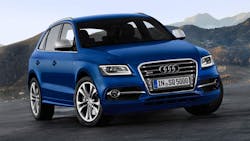Chinese Dream Trumps Environment as Cars Sales Boom
SHANGHAI -- When accountant Ariel Wang bought a new car a few weeks ago, environmental protection was far from her mind even though smog has reached crisis levels in China's commercial hub Shanghai. She settled on a sturdy sport utility vehicle, the Audi Q5, as the ideal family car for her husband's daily commute to work and transport for her young daughter at the weekends.
"We didn't really think about environmental protection, as long as the car's emissions aren't too high," she said. "Look at it this way -- whether we use a car or a taxi, it's the same effect."
Shanghai has long been considered more sheltered from the notorious smog that blankets large parts of northern China, but in December the city's air quality was so bad that flights were grounded and sales of face-masks rocketed.
Across the nation -- the world's largest auto market -- air pollution caused by vehicle exhaust and smoke-belching factories has failed to cloud the dream of owning a car, despite growing concerns over the impact on health.
China's rapid economic growth has created huge wealth and a rising middle class, with 109 million people owning vehicles for personal use at the end of last year, up from 93 million in 2012.
Limits on Vehicle Numbers
But some Chinese cities, choked by smog and plagued by traffic congestion, have slapped limits on vehicle numbers, to the dismay of would-be car owners and manufacturers alike.
The famed tourism spot of Hangzhou last month unveiled rules to limit the cars which clog the roads around its scenic West Lake and elsewhere, becoming the sixth major city to make such a move.
Announced with just five hours' notice, the policy sparked panic buying of cars regardless of make or model as consumers sought to log the purchases before the new system took effect. The policy could limit car plates to 80,000 a year.
"People were buying cars like they were cabbages," one customer told a state newspaper, using the Chinese equivalent of hot cakes.
Hangzhou will use a combination of a lottery system and an auction to limit the number of car plates issued, following in the tracks of Shanghai and the capital Beijing, as well as the cities of Tianjin, Guangzhou and Guiyang.
Such moves to limit vehicles could ultimately cut into national sales, at a time when China's economy is slowing and the government is frowning on luxury purchases in a crackdown on official corruption.
But the buying of more environmentally friendly vehicles could help offset the moves -- if they can attract customers.
"This will have an impact on overall new vehicle sales in the country," said Namrita Chow, principal analyst for IHS Automotive in Shanghai. "But people will buy higher quality cars with better engines."
Last year, China's auto sales surged 13.9% to 21.98 million vehicles, according to a Chinese industry group, as a recovery in Japanese brands previously hurt by a diplomatic row offset the impact of slowing economic growth.
The government has sought to increase ownership of electric vehicles with the aims of reducing pollution and building up domestic manufacturing, but demand has disappointed.
Last year, the central government offered subsidies of $5,700 to $9,800 for buying electric passenger cars, while local-level incentives can cut even more off the price.
Little Demand for Electric Cars
Chinese auto parts group Wanxiang snapped up the assets of failed U.S. electric carmaker Fisker Automotive for $150 million to make inroads into the segment.
Sales of "new energy" vehicles -- which includes fully electric cars and hybrids -- were around 25,000 in the past two years, estimates Cui Dongshu, deputy secretary general of the China Passenger Car Association.
"The volume for this segment is definitely not big," he said.
China has set a target of having five million new energy vehicles on the streets by 2020.
But with Chinese buyers -- many first-time owners -- hoping to make a splash, electric vehicles have taken a back seat, while local governments are reluctant to invest in charging stations given that so few such cars are on the road.
Still, some automakers see government support for the initiative as a market opportunity.
Ahead of the Beijing auto show which opens to the public on Monday, Audi announced it would launch a plug-in hybrid for the China market, and Hyundai Motor said it would set up a $290 million research center in China to develop new energy vehicles.
Another U.S. electric carmaker, Tesla Motors, has caused a splash in China with aggressive advertising and by pitching its vehicles to luxury buyers, although analysts said they might only find a niche market.
- Bill Savadove, AFP
Copyright Agence France-Presse, 2014
About the Author
Agence France-Presse
Copyright Agence France-Presse, 2002-2025. AFP text, photos, graphics and logos shall not be reproduced, published, broadcast, rewritten for broadcast or publication or redistributed directly or indirectly in any medium. AFP shall not be held liable for any delays, inaccuracies, errors or omissions in any AFP content, or for any actions taken in consequence.
